Against all odds: Tribute to Ezinne Margaret Nwomeh
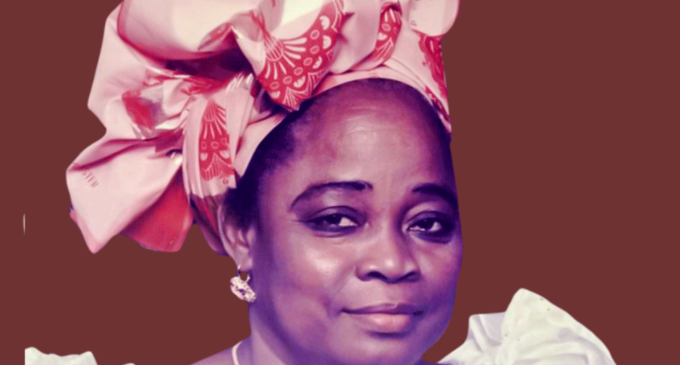
BY BENEDICT NWOMEH
In the heart of turmoil, amidst the tumult of war, Mama stood as a pillar of strength, her unyielding faith and boundless love guiding our family through the darkest of times. Her story is one of resilience, sacrifice, and unwavering commitment to those she cherished.
Despite her dreams and aspirations, she set them aside as Papa pursued his education at the new university in Nsukka.
Mama was not one to idly watch as life unfolded. When she was pregnant with Angela, she rolled up her sleeves and worked as a seamstress to help support Papa. While Papa tilled the farmland during his university holiday, she diligently laboured alongside him in the fields. Together, they laboured tirelessly, scraping every penny to make ends meet.
With the arrival of each new child, Mama dutifully trailed her husband to every teaching post. In 1967, when Papa was teaching at the Apostolic Christian Grammar School in Aba, Mama found out she was pregnant with Ijeoma. But during labour at the General Hospital in Aba, Mama faced another challenge: her only son fell seriously ill with measles and was admitted to the same hospital.
Years later, Mama confided in me that because I hadn’t been vaccinated, she had feared for my survival. It was a perilous time; many children who weren’t vaccinated didn’t survive such dangerous infections. Yet, against the odds, Mama received a double miracle. We were discharged from the hospital, both me and newborn Ijeoma (“Nwa Aba”), hale and hearty.
Tragically, just a few months later, disaster struck when the civil war erupted, and Nigerian fighter jets bombed our house in the teacher’s quarters in Aba. My parents gathered the three of us, and our cousin Chiedozie, and fled back home to Ozara.
Mama recounted her second miracle as the incident during the harmattan season of 1968 when our family sought refuge on the banks of the Iyi-Ozo river, near Obodo, southwest of Ozara. I was with Edo when an object, later identified as a bullet, narrowly missed me and hit a bamboo near the shade where we were sitting. In the panic that ensued, our family moved north to Obuoffia, seeking refuge with my paternal grandmother’s family.
Two years after Ijeoma’s birth, amidst the chaos of war, the twins arrived, but in precarious circumstances. Mama’s noticeably enlarged belly raised suspicions among the Obuoffia villagers. While neighbouring towns had abandoned the practice of twin infanticide, it remained customary in Obuoffia.
Mama had received antenatal care at Umueze, a village 5 kilometres to the south of Obuoffia, where a refugee camp was located. Fearing for the safety of the twins, Mama was detained at the camp in Umueze for two weeks until she delivered.
Angela and I stayed behind in Obuoffia with Onoo Akegbe, our paternal grandmother, and later reunited with the family in Ozara. Many years later, Mama recounted this event as her third miracle—bringing two healthy babies home, this time to our ancestral land. One was named Edward, “Ndubuisi” (life is paramount), and the other, Daniel, “Osondu Agwu Ike” (one is never tired of running to safety).
For our family, any lingering apprehensions from our time in Obuoffia were softened by the profound joy of surviving the war together. Mama played a vital role in nurturing and strengthening our bond with our Obuoffia relatives, fostering connections that transcended distance and hardship. As a child, I eagerly anticipated the 4-kilometer journey to Obuoffia every long vacation, where we would visit our kin in the Chief Nnaji Ani Nnaji compound in Umuiba. Also, I was warmly welcomed into the Royal Court of late Chief John Igwesi, the esteemed Igwe of Obuoffia, who became not only a mentor but also a generous benefactor during my formative years.
During the war and in the aftermath, our family repeatedly sought refuge in or near our hometown, Ozara. This experience deeply influenced Mama’s upbringing of us, instilling in us a profound reverence for our town. To us, Ozara became sacred ground, a place where we believed God had purposefully placed us.
On the fateful day of March 12, 1970, tragedy struck our family as Papa was called home, leaving Mama shattered. The war had just ended, and Mama, at the tender age of 23, found herself widowed with five young children to care for. Angela, the eldest, was merely 7 years old at the time. Mama was thrust into a world of uncertainty, facing homelessness and the daunting challenge of providing for her children with no means to do so.
Amidst the haze of post-war years, my earliest memories of Mama began to take shape. Even as a young child, I observed her unwavering resolve to secure our survival. One poignant memory stands out vividly: Mama’s relentless struggle to ensure we had food on the table. At the age of 5, I was too young to start elementary school. However, as the Red Cross distributed food to school children, our family faced a challenge with only Angela being of school age. Having another child enrolled could be a turning point for our family.
The headmaster of St. Paul’s Primary School, known for his strict adherence to rules, initially refused to enrol me in school for being underage. Undeterred, Mama visited his office every day, pleading with tears in her eyes. I recall sitting on the steps of the headmaster’s office as the drama unfolded each day. On the fourth day, moved by her persistence, he relented, and I enrolled in school with Angela.
Angela and I arrived for Elementary One at St. Paul’s with our slates and chalk, dressed in uniforms meticulously sewn by Mama using the sewing machine that had miraculously survived the war. Most importantly, though, we also each brought a deep aluminium bowl. At school dismissal, our bowls were filled with food from the Red Cross. As we lived just across the road, we would often return for more helpings, sometimes even climbing into the food drums to scrape rice from the bottom.
At that tender age, I barely grasped the gift of education that Mama had just secured for me, nor how her face-off with the headmaster had helped prevent my family from starvation. However, at that moment, I understood that she had won a crucial battle, one of many she would courageously fight for our family in the years ahead.
In the struggle for our family’s survival, Mama was unwavering and determined, ensuring that none of us would be left behind. Throughout those difficult times, she encouraged us to adhere to the Igbo proverb “Onye aghana Nwanne ya” — “One who does not care for their sibling is unworthy.” This principle was put to the test on two pivotal occasions.
When Angela and I had to attend secondary school, Mama faced a heart-wrenching dilemma: she couldn’t afford school fees for both of us, and the thought of choosing one child over the other tormented her. Thankfully, my late uncle, Chief Francis Udeh, stepped in to assist with my fees through secondary school.
As I neared the end of high school, once again I watched Mama grapple with the tough decision of whether I should pursue a university education. Initially, she decided against it, fearing the financial strain it would place on our family and the challenge of caring for my siblings. Unable to secure the ten naira (N10) needed for the JAMB application from either Mama or my uncle, I sought help from Chief John Igwesi of Obuoffia, who generously provided the funds.
Undeterred, Mama set out on a determined job hunt on my behalf, persisting until she finally relented after a meeting with Dr. Ugwu Nwafor Ujam of Akegbe-Ugwu. Dr. Ujam, an Oxford-educated scholar who had known Papa, served as the chairman of the Civil Service Commission of the old Anambra state. During our visit, he gently but firmly reprimanded Mama for seeking employment for me and helped her reconsider her stance regarding my university education.
A few weeks later, when the JAMB results were announced and I secured admission to medical school, Mama’s demeanour was a mixture of nervous cheerfulness, concealing inner turmoil and apprehension. However, once again, assistance came to our aid. Scholarship awards from the Anyidinotu Social Club of Ozalla and Chief Thomas of Egbo of Nara Unateze provided crucial support. Most importantly, the backing from my uncles of the Umunnajinwude ancestral clan, led by Chief Nwachukwu Ekenta and Chief Francis Udeh, promised to ease Mama’s burden and allowed her to breathe easier.
Despite her education being interrupted to support Papa through university, Mama faced further upheaval with the war and Papa’s passing. However, fueled by determination and with the sponsorship of Chief John Igwesi, she swiftly transitioned into a new career in healthcare as a nurse/midwife at the maternity/dispensary opposite our house. Mama was ready to cast off the burdens of yesterday: a crisp new dawn had arrived.
In the late 1970s, the Ozalla Health Centre was established as a primary healthcare centre under the National Basic Health Services Scheme (NBHSS). In 1979, Mama would be among the inaugural class to receive training as a community health aide at the School of Health Technology, Oji River. With this six-month residential training programme, she would return to formal schooling again, after a 17-year disruption.
In 1982, Mama was presented with the opportunity to enrol in a two-year officers’ training program, promising career advancement and increased earnings. However, it posed a significant challenge for the family since it required her to reside away from home. Despite this, the thought of attending school alongside her children filled her heart with joy. Additionally, she looked forward to participating in the same training program in Oji River as her maternal cousin, Nkeiru Chinwetalu, who had become an indispensable part of their family. Over the years, Mama progressed through the ranks, starting as a community health aide and working her way up to become a community health assistant (CHA), ultimately retiring as a community health officer (CHO). Throughout her career, Mama devoted herself to serving numerous communities in Nkanu, leaving a lasting impact on the lives of those she served.
During my time at medical school in Lagos, I was fortunate to receive instruction from Professor Olikoye Ransome Kuti, and I belonged to the inaugural class that was introduced to the primary healthcare (PHC) curriculum he spearheaded. Later, when he assumed the role of minister of health, he translated this curriculum into governance, catalysing the nationwide expansion of the PHC programme. Through this experience, I gained a renewed understanding of the invaluable work my mother was undertaking back home among our community members.
Decades later, during my graduation from surgery residency in Richmond, Virginia, in the United States, Mama sat beside my wife, Henrietta, who was pregnant with our daughter Chioma, while Ijeoma and her husband Joe were also by her side. As I looked at Mama, I couldn’t help but wonder what thoughts were running through her mind.
My thoughts drifted back to a time when I was about 8 years old, gathered with all five of us siblings on a mat under the bright moonlight. Mama was unusually cheerful that evening, and she initiated a conversation about our future careers, starting with the youngest, the twins. It all seemed to be in jest, but it stuck with me.
Edy wasn’t speaking up, but as a frequently argumentative kid, Mama said he’d probably be a lawyer. We all nodded in agreement. Dan mumbled something. “Obia odanwa,” Mama hailed him, as she often did, using the name of our maternal grandfather (Mama’s father) for whom Dan is named. “You will be a rich businessman.” We all laughed.
Next, it was Ijeoma’s turn. Without missing a heartbeat, Ije said she would be a nurse. This was not a surprise to anyone. As a child, Ije hovered around Mama in the maternity ward and was often by her side as she helped take care of the sick villagers who swarmed our house with their many ailments.
As it came to my turn, I responded that I wanted to be a doctor. It was the first time I had voiced this dream to anyone. I had been inspired by Mama’s dedication to healthcare and positively influenced by the reverence accorded to doctors who visited the Health Centre from Enugu every few weeks. At one time, we lived in the quarters within the Health Centre, so I had easy access to these visiting doctors. Mama’s pride was palpable as she pulled me close whenever a doctor inquired, “Is this your son?” These were among the many unforgettable moments shared with Mama.
Angela, on the other hand, expressed her aspiration to become a teacher. At the time, I might have been too young to fully grasp the significance, but as the years went by, I grew quietly proud of my big sister for stepping into Papa’s shoes. Papa had made a lasting impact through his teaching career across Nkanu, and now Ada Peter Nwomeh was continuing that esteemed tradition.
Mama and Papa seemed to have meticulously orchestrated our births, as we arrived at intervals almost perfectly two years apart—one in March and four in April. Also, they had given us names in alphabetical order: Angela, Benedict, Calista, Daniel, and Edward. Leafing through Papa’s diary, I stumbled upon a section containing details on each child, with each one occupying a separate page. Interestingly, the sixth page was marked with “Francis or Francisca.”
On that evening, as we sat beneath the moonlight, I witnessed a glow envelop Mama—a blend of satisfaction and apprehension. Perhaps it was satisfaction that her children, even the four-year-old twins, were all poised to conquer the world, but certainly, there was also an undercurrent of fear. Perhaps she feared that the magnitude of their aspirations would surpass her ability to provide the necessary resources. At times, I found myself wondering if Mama ever fantasised about that sixth child and what he or she would have aspired to become.
Growing up in Fonkonas, we were filled with constant talk about Papa, but it was Mama who patiently explained to us who this man truly was. Who could have understood him better than the woman who, despite enduring countless hardships, remained fiercely devoted to her husband—whom she always reverently referred to as ‘oga m’? At great personal sacrifice, Mama never remarried — a decision that continues to astound and humble us.
While instilling in us the code of honour expected of the “children of Peter Nwomeh,” Mama also went to great lengths to ensure we enjoyed a normal childhood alongside other neighbourhood kids. She taught us the importance of family, tirelessly working to maintain connections with all our extended relatives, in every direction, and never once attempting to sever our ties with anyone.
Mama fostered a spirit of generosity within us, serving as the driving force behind the creation of the Peter Nwomeh Foundation. In honour of both our parents, it will now be renamed The Peter and Margaret Nwomeh Foundation, and its sister charity, the Peter and Margaret Nwomeh Foundation USA.
Before Mama became very ill, she began to call me more frequently. On the last phone call, she asked about my wife Henrietta, then the children, Chioma (“Ogbom”), Chiedozie (“Oga m”), and finally about Chukwuemeka. For years, our conversations often revolved around Emeka, my son who has autism. Mama had taken to more frequent visits to the Adoration grounds to pray for Emeka’s recovery. Little did I know at the time, but on that final call, she assured me she was still praying for him.
Mama’s devotion to God, particularly through the Catholic Church, was unwavering. She justified her complete surrender on one premise: without Him, our family would never have survived the devastation, poverty, and desolation that befell us in 1970. Also, Mama recognised the crucial role the church played in preventing the starvation of our people during and after the war.
As we bid farewell to Mama, we do so with hearts full of gratitude for the 77 years of love, sacrifice, and unwavering devotion she bestowed upon us. May her soul find peace in the loving embrace of our Heavenly Father, and may her memory continue to inspire us all.
“O God, the Creator and Redeemer of all the faithful, grant to the souls of your departed servants the remission of all their sins, that through our devout supplications, they may obtain the pardon which they have always desired.”
Nwomeh is a professor of surgery and vice-chair of global surgery in the department of surgery at the Ohio State University Wexner Medical Center, USA.
Views expressed by contributors are strictly personal and not of TheCable.


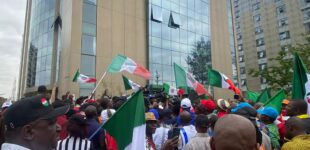


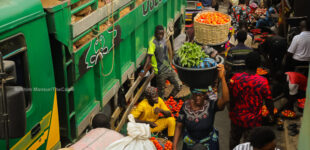


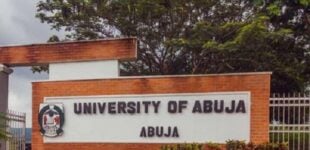

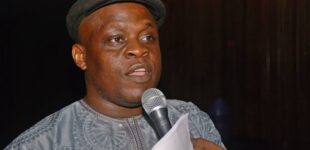

There are no comments at the moment, do you want to add one?
Write a comment